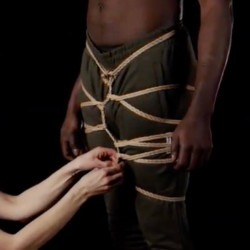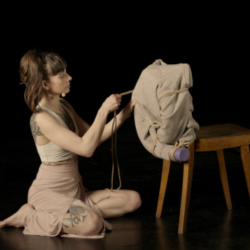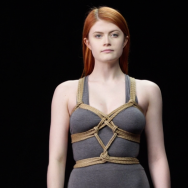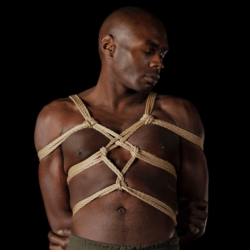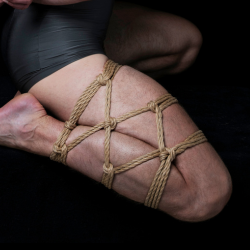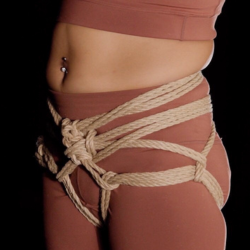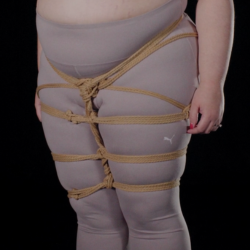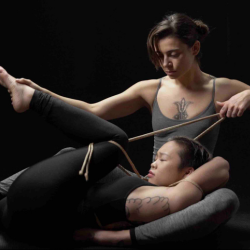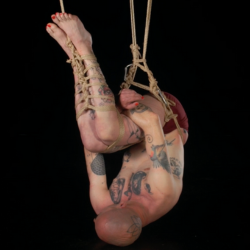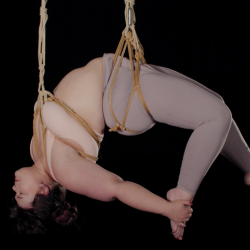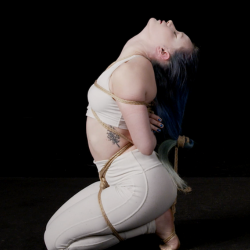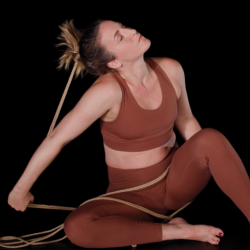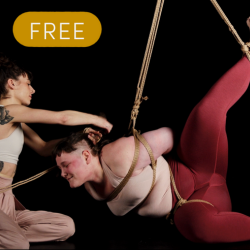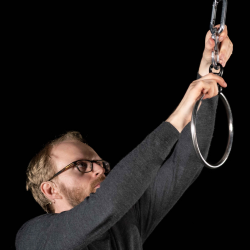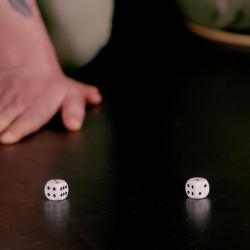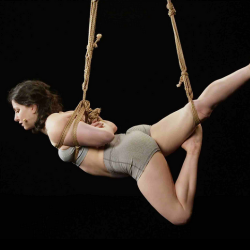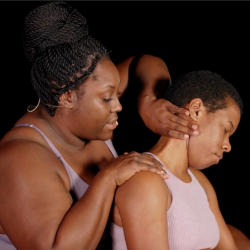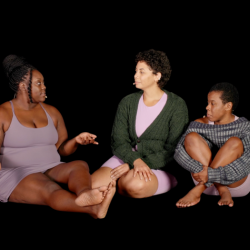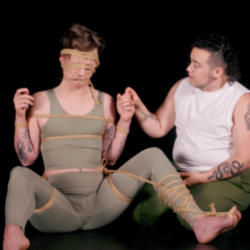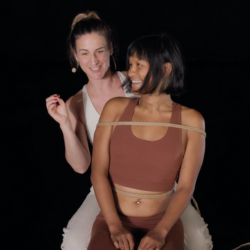EP 09
TOMPORARILY
In this episode, Wren and Tom talk about the parallels between poker and rope bondage and how it impacted his negotiation process.

Tomporarily is an Austin-based photographer and "sadistic-ish shibari-ish" artist with a background in poker.
Wicked Wren [00:00:21] Welcome to the Shibari Study podcast. I'm your host, Wicked Wren. On this episode, I chat with my friend Tom. I was looking through your Instagram. You have this really cute photo from like 2020 where you're just like Peter Pan, and you're tying a Wendy.
Tomporarily [00:00:39] Yeah, it was with Joy in DC.
Wicked Wren [00:00:42] What was the context?
Tomporarily [00:00:44] I think the context was green, was like the theme of the court, I guess. I'm sure I'm butchering that. But yeah, we did a performance as Peter Pan and Wendy, which was great.
Wicked Wren [00:00:56] I love it because in the majority of your photos, you're not smiling, but in that one you are.
Tomporarily [00:01:03] I feel like in the majority of my life, I'm smiling. I'm known for laughing loudly. That's probably like how you can hear me across the dungeon before you see me.
Wicked Wren [00:01:10] I love that. And I would not get that appearance from your Instagram because it looks like you're into like very intense, maybe Semenawa-style rope, maybe like a lot of suffering and things.
Tomporarily [00:01:23] Yeah, I think so. As things get more intense, I think a lot of the stuff I share on Instagram is either in M positions or like humorous points to get there.
Wicked Wren [00:01:32] Yeah, it's difficult to share the journey on Instagram.
Tomporarily [00:01:36] M- hmm.
Wicked Wren [00:01:37] Yeah. You've called your rope style Follow your (…) before.
Tomporarily [00:01:45] Yeah. There was a period of tying that I didn't like the idea that anybody else was telling me what to do, or I followed some prescriptive pattern, and I think I, I almost pushed the pendulum too far in the other direction but I didn't have enough technical proficiency or accuracy to necessarily, like, get a cuff the size that I wanted. So I learned the hard and fast way to like – as I made accidents, how to come back and clean them up later and Follow your (…) was my sense of like staying in the moment and going the direction that you wanted to rather than having an end goal that you started with and trying to get there.
Wicked Wren [00:02:16] That's awesome. And I'm sure it leads to better communication with your bottom and everything, because that's the best part of bottoming is when the top is actually looking at you and watching you rather than (…) around with a cuff size and trying to get that perfect because as the bottom, I don't care about that. I just want you to care about me, you know.
Tomporarily [00:02:35] The experience you're creating I think is the most important part in the like amount of times I've watched bottoms stare at the wall, doing their taxes in their head or in an intensive-like class or something like this. This is really tough. So the idea of like, I always want my partner to be engaged and I have a fear that like if at any point they're bored, I won't recognize it if I'm focusing on the rope per se.
Wicked Wren [00:02:53] Yeah, and it sounds like you realize that early on, rather than I feel like most people start very, very technical and then bring the bottom in, correct.? Whereas it feels like you do the opposite maybe.
Tomporarily [00:03:05] I definitely had somebody come up to me at an early event when I was tying like a god awful two-rope futo that I had pulled from somebody's Patreon and in the same breath that they leaned down or in the same breath that they said, like, what is this macro made (…)? They lean down and help me untie and retie and actually engage with my partner, which is, which is great.
Wicked Wren [00:03:26] That's awesome. Do you remember who did that for you?
Tomporarily [00:03:29] Yes. That's the style of feedback that I very much prefer, it's somebody from Austin.
Wicked Wren [00:03:32] I love that. So with online education, do you use a lot of online stuff now or like how are you mainly in taking new info?
Tomporarily [00:03:42] I love watching people tie who are like proficient at it. I think a lot of the nuance of like how you finish something or how you start and the hand movement and how they engage, it's been the primary method of online education that I saw recently. I think RopuNawa put out the most recent like intermediate pack of videos that I purchased that was really good. Shibari Study has been great for either recommending the people or like keeping up on the live classes that I have been enjoying. But YouTube and the free stuff, I kind of tend to stay away from for the past couple of years.
Wicked Wren [00:04:15] Yeah, YouTube is kind of a mixed bag.
Tomporarily [00:04:17] It's a very mixed bag. My favorite thing to do is take like experienced bottoms who visit and make them watch like the – here's a pattern that I did on YouTube-type videos, the like eight minute on a mannequin. Uff.
Wicked Wren [00:04:30] Oh, that's great. Yeah. Yeah.
Tomporarily [00:04:32] Different versions of suffering.
Wicked Wren [00:04:33] Well, look, a mannequin, you know, doesn't really give a lot of feedback. So sometimes it can be a really fun experience.
Tomporarily [00:04:39] That's why they tie them.
Wicked Wren [00:04:42] Right. So you taught a class called Rope for (…).
Tomporarily [00:04:47] Oh, God.
Wicked Wren [00:04:47] Can you tell me a little bit about how you structure pain in a rope sequence?
Tomporarily [00:04:52] That is a great question. So I think one of my other core rope memories, I think about a year into being lost in patterns and kind of resetting that somebody came up from San Antonio and they were recommended by Kim, who I taught that class with as the first and only person to make them cry with rope. And so I thought, like, I really got to go see what this is about. His style of teaching and tying was like, You apply rope and you step on it to add tension until you hear noises or see pain reactions, and then you reverse tension and go a different way. And it blew my mind that like rope was something that you could more or less use to reconnect rather than something that you had to like sit there and rack your brain thinking of the pattern where you apply whatever.
Wicked Wren [00:05:34] Yeah. And you said you were lost in patterns for a while. How did you get out of that? Like, what was the spark that got you out of being so concerned with the patterns and things.
Tomporarily [00:05:44] Was more or less a lack of self-awareness, I think, around like, what was actually happening, right? Like, it's easy to see in other people's scenes. It's hard to see in yours. And so, like opening up to feedback, going to therapy a bunch, having very compassionate partners who held my hand for the first couple of years of like, Oof, there's some painful videos of me like trying to take down a partner for two and a half minutes while they're single pointing a futo. It's, it's a journey.
Wicked Wren [00:06:07] It is. What are some things that you did in the beginning or do now when something's going wrong? Do you have a mantra that you say to yourself? Do you have some way that you reset in a scene, something like that?
Tomporarily [00:06:20] Yeah, I think like a deep breath and a reconnection and like, I haven't had like a panic emergency take down moment in a minute, but just being able to smoothly and calmly talk through that and then having a plan that I know that – it's probably not through repetition that I wouldn't like to go back and pay that tax again. But knowing that if anything does go wrong, I have the ability to circle back and reconnect with my partner after has been a big like – if it's going wrong in the scene, I don't fear it enough that I keep going with whatever plan I had. We just take a breath and say like, Hey, this isn't working for us. Like, what can we do to pivot since we're here and we want to tie? And maybe the energy that we anticipated showing up today (inaudible) is what we want to do in somebody's living room or whatever event we're at.
Wicked Wren [00:07:01] Yeah, and a lot of people don't talk about that, but it's happened to literally everyone. You know, everyone's met in a situation where they're like, this isn't going great and someone's been in a single futo for too long while you're trying to get them down, like it's a common thing and it's not talked about enough because we expect people to have these pristine track records and it's just not.
Tomporarily [00:07:21] Oh yeah, for every pristine track record you've, I don't know of a single person who's risk profile or skill set is currently calibrated not on some sort of mistake in the past that they regret.
Wicked Wren [00:07:31] So you travel a lot, right?
Tomporarily [00:07:34] Yeah. Yeah.
Wicked Wren [00:07:35] That's awesome.
Tomporarily [00:07:35] I have a job that we fly for work a bunch, and it's easy to pull up FL and see what rope events are going on in what town.
Wicked Wren [00:07:40] Well, I'm actually curious about that, too, because you seem like a very methodical human being. Europe is super clean and put together. What is your background in?
Tomporarily [00:07:52] I played poker professionally for a long time, so I have like a weird mathematical slash structured approach to a lot of things, and I probably pull a lot from that. But it's a little bit of that, a little bit of ADHD and math mixed in.
Wicked Wren [00:08:05] When you're playing poker professionally, what does that look like? What are you doing on a minor scale while you're playing a game? I don't really understand that.
Tomporarily [00:08:17] It's a lot of fun and it's it's like, what are you doing in a rope scene, right? So there's there's a lot of nuance that goes into your core approach and what you believe and like what you fall back on. I think for me, I started playing online and I applied the mathematical concepts of like, what does the math say in this situation? How much do I have to bet to actually know what's in the middle? What's my equity in this hand? Are you going to win or lose? When you get to showdown? Do you need to bluff? What opponent are you doing? And then you fall back on the core principles usually of like even if I know that in like a paper, scissors, rocks analogy, right? If I'm meeting somebody who has stamped on their forehead, like I always throw rock that I need to know, I need to adjust to throw paper 100% of the time rather than whatever it is. So it's a fun game of information exchange and how well, you know the math behind the cards.
Wicked Wren [00:09:01] Wow. That is absolutely fascinating. What are the biggest parallels between poker and rope bondage? Are there any?
Tomporarily [00:09:11] There are and I think it's it's a hard thing to discuss, but I've definitely tried to in Austin that I think I calibrate risk profiles differently than everybody else. And it sounds a little bit sociopathic when you get down to it. But your idea with poker is that every move has an expected outcome with whatever random chance. And so you'll apply like percentages to it, I refer for lack of a better term. So I did the like risk calibration early on of like what does this up-line cost me financially and how much am I willing risk dropping somebody on their head. And if I do, what's the like monetary outcome that I would pay to abate that? And then backing into the calculation of like how much should I spend on my appliance or what should I recycle my kit?
Wicked Wren [00:09:53] Wow. Very, very thought out. That's incredible. I don't think anyone else has that perspective.
Tomporarily [00:10:02] It was an interesting one. There's, there's actually one more person up in Seattle that played poker professionally for a little bit, too, that when we found out – we've been best friends.
Wicked Wren [00:10:10] That's so cool. And I think I know who you're talking about. And now that I hear that, it makes total sense. In your travels, like when you see people tie, what do you think makes good rope and what do you think some of the intangibles are that people do that are really, really hard to teach?
Tomporarily [00:10:28] I think the like core of interacting with the partners that I've seen across communities is really interesting. And there are some communities who start with that as their like growing piece. They had influence early on for people who otherwise had like martial art, dance, background type influence, and watching them go through the like motion of tying is really, really interesting. The people who had the more like technical approach or the approach that was like telephone game through some core tenet of that is is always the one that's a little bit several steps removed, right? They're like we're doing it to do the acrobatic thing rather than the we're doing it to like interact thing.
Wicked Wren [00:11:03] Yeah, I feel like (…) is one of the only things that has such diversity because 99% of people have other lives outside of the rope bondage that they do or the (…) activities they do, and they all bring that in, whether it's martial arts or poker or anything like that. How do you do an intake negotiation process since you are a poker player?
Tomporarily [00:11:30] I have changed that so many times. So I'm very Type A and I had like a negotiation sheet and I think there's this concept that I pulled from my day job, which is a little bit management baked in. It's called like task-relevant maturity. And the idea is that like beginners need checklists, intermediate people need to understand the why behind the checklist and explore it. And advanced people need to like have a bigger framework for how that checklist is applied. So I think like checklists and negotiation are great, so you don't forget something, but at some point, they enter like the upper limit of what you can achieve and or like how (…), for lack of a better term, you're going to be about the thing that you're doing. Which is why the first question on my intake checklist or like the negotiation sheet was like, What are you worried about? Right? Like, what are we creating or both excited about? From there, though, it's gone from like having a Google form, which somebody in Houston recommended as like a process that they thought achieved enthusiastic consent in their thing and did it in a way that wasn't coercive or allowed people to like, think away from the stress of the first negotiation and meet, I think like meeting prior for coffee definitely helps. It all depends on the frequency of you tying with somebody and how you interact.
Wicked Wren [00:12:36] That is a huge thing. Trying to meet before and just like saying hi and stuff, it's like makes a massive, massive difference.
Tomporarily [00:12:43] Mm-hmm.
Wicked Wren [00:12:45] Can you tell me a little about the local group in Austin?
Tomporarily [00:12:48] Yeah. We have a lot of interesting stuff happening after the pandemic, particularly, I think the pandemic brought in a bunch of new people who haven't been introduced to, like necessarily the wider community or like rope events that have happened in the post-COVID era of what does it look like without masks? Does it look like with risk profiles that people come in with? So Austin Rope Slingers is the primary big one that runs every Monday night. They've been a core part of the Austin community for however long they've been running. For five-plus years now, at least. Long before that, certainly. But they've been running every Monday night. Kim and Knisley out of ATX Empty Space does open rope every other Tuesday night, which has been amazing. Bliss runs that with her. It's been really good. And then we have like monthly parties at Shriner TNG, those have been great too.
Wicked Wren [00:13:32] That's awesome. Earlier when you're talking about consent negotiations and things like that, we were recently talking about Lief's, our friend Lief Bound's (…) dungeon theory of safety, which I think is so funny. Our friend Lief essentially said that in a – that dungeons used to look like dungeons. They used to have an inherent risk when you walk in, much like when I was getting tattooed early on, it was on a weight bench. And now these places like dungeons and tattoo parlors that look like Apple stores.
Tomporarily [00:14:08] It's really interesting that we're hearing Lief say it, it's like, I can't imagine 18-year-old Lief walking in and thinking like, I have to keep my shoes on because there's (…) on everything and I don't want that like... But it puts you in an entirely different mindset of how I approach people that I interact with. And when you walk into spaces now and there's there's clouds on the wall and it's empty space in yoga mats in the corner, I can imagine how in the frenzy of initially being introduced, you drop your guard and think like, Sure, like this person who asked me to come over to their place in tie, why would I not? But you need to keep your guard up. And the idea that we've sanitized in some way, shape and form that out of the aspect, I think is possibly introducing a little bit more danger that's, that's unaware for the people who are being introduced.
Wicked Wren [00:14:52] Yeah we've sanitized the whole Instagram thing as well. You miss all the context of everything going on. I was recently at Folsom. I was tying with KissMeDeadlyDoll and people were coming up and asking if we knew each other, if we tied together before and I was like, You just don't understand this at all. That's crazy.
Tomporarily [00:15:15] Yeah. It's hard to do what y'all did. I'm sure it's like a total pick up from lack of a better.
Wicked Wren [00:15:19] Yeah. Yeah, that's like, that's not how it works.
Tomporarily [00:15:22] I think it's interesting to see across context in cities how people interact. So I've seen a lot not only like traveling too, but seeing people across cities who meet in otherwise, like they don't bring the awareness of the culture of their city into the context of how they negotiate new plays too. You end up with different paradigms of like an introductory scene from somebody on the East Coast that I've seen tie in introductory scene from somebody who came from, let's say, Northwest. It's a totally different application of this two-hour thing that I'm expecting is not a 30-minute intense thing that you're expecting or vice versa.
Wicked Wren [00:15:53] It is really wild when you like see how different people engage and things around the country. That's really, really wild. You said that you're new to camera and video work, and from looking at Instagram, I would not think you're new to this whatsoever because your photos are beautiful and they capture the core of what you're doing. They're always focused on your rope bottom. It's never about your rope, it's about the bottom, which I really appreciate it.
Tomporarily [00:16:18] Thank you. Yeah, that's been a journey to craft. I think I started and had my cell phone and would like pull away and almost had this like anxiety of a row tax for people that I tied, right. They love to post three photos I had to get three ones that were different enough that look like not the same thing twice. And that took me out of the moment. And so like introducing a camera and saying like, I'm doing this so that I can capture things that I'm appreciating. It's not something that you have to pose for, interact with was big and I think I had originally like a tripod in the corner of a room that I put on video and somebody, when I told a joke like curtsey towards the camera and it just took me immediately out of the moment of like, this is a person in the room that I don't want to be here. So now I try to like throw the camera around on the floor, which is why a lot of the angles are just purposefully not good so that the camera is not set up so that you can track it in your mind because that's not something I want you to be doing if we're tying together.
Wicked Wren [00:17:10] It's so funny you said not good with big air quotes because in my opinion, the quote unquote not goodness is what makes it so good. Because it makes me feel like I could be there. Because it looks and I don't use, I don't mean this negatively but more amateur than a studio set which isn't hot because we know it's produced. But when it comes from your iPhone and there's one where you have a rope bottom and your phone looks like it's, like you got thrown in the corner and happened to catch it, that's so hot.
Tomporarily [00:17:45] When I have the like fully zoomed out, full set photo, I end up judging what I'm doing a lot more because it's hard to craft like a perfectly aesthetic living room of rope thing, whatever. Like the lighting is never perfect. The rope and angle that you end up with is never square. You have lines that don't work whatever. The like, throwing around of the camera does help me appreciate what's happening in a way that like, even if I can't see the thing that's being tied directly like the expression that people make through their extremities or like what they do with their feet to self-soothe and how their toes like overlap and touch. There's there's beauty in that that like if you take a step back and appreciate is, is what really I think I've shared in a lot of the videos in the past year that I've found unique and special.
Wicked Wren [00:18:24] Yeah, no one cares about the plant in the background and if they do, you're doing something wrong, right? I also feel like as a bottom, I love when a camera's like just kind of in my face and look at me versus like when you're like leave. So it sounds like you've gotten a really good relationship with the camera in the scene.
Tomporarily [00:18:47] Yeah, Yeah, I like where we're at now.
Wicked Wren [00:18:49] The other thing that when I think of your name, I always think about up-lines. I think about the videos that you make with the up-lines and I just really love them. They're so meditative. Like during quarantine I remember doing my little up-line practice with you and have you on the video.
Tomporarily [00:19:05] Ah, I'm so glad.
Wicked Wren [00:19:06] I loved it.
Tomporarily [00:19:07] It's something that I think was a trauma response to my like two and a half minute taking my partner down from my futo I think.
Wicked Wren [00:19:14] Oh, that makes sense.
Tomporarily [00:19:16] Easy to practice alone and like the webbing slash whatever exercise I go through my kit, it'd be a method to condition it, but it really helped manage the rope ends as there are like Munter hitch through so you get a lot of finger dexterity practice through that. I will say my favorite thing though was that didn't translate to like how you put rope on the body. And one of my partners who is otherwise very reserved it seems like in their interaction at the end of our scene was just like for somebody who practices as much as you do, your rope handling is mediocre at best. It was, it was a beautiful moment of just like accepting that they would not have said that to me if they didn't feel safe with me. And so I think I just laughed. And that's been an inside joke for for a long time since then.
Wicked Wren [00:19:55] Well, I feel like that's why you're awesome. It's because your ego didn't get hurt. And the worst thing is that if you're like, if you got hurt and you're upset about that, but... Are you still doing the webbing and things like that.
Tomporarily [00:20:09] Much less often. But yeah, I reserve it for like when I get a new kit, that's how I'll break it in. Now it's an easy way to get it smooth enough to go on the body and keep up the dexterity, but it's much less often than it was before.
Wicked Wren [00:20:21] That's awesome. Are there any final words on connection that you would like to share? Maybe your journey of connecting with your rope bottom? Anything you found out throughout the years of you doing rope and things like that, or any hurdles you had to overcome that, that are hard to get over?
Tomporarily [00:20:42] I think I joked at some point when my up-line started being less, less of a practice point, I started going to therapy, and I think therapy has been the number one thing, It's done a lot for my rope. It got a lot better when I started consistently going to therapy, and that says a lot about where I was when I started.
Wicked Wren [00:20:59] But you're the second person to say that on this podcast. I'd like to be clear.
Tomporarily [00:21:05] It's just, it's so true, right? Like, you can't actually bring enough self-awareness to what you're doing or how it's actually received or what you're hearing back. And it's it's a vulnerable experience on both sides.
Wicked Wren [00:21:15] It really is.
Tomporarily [00:21:15] If you can't hold some space for yourself and compassion, you can't do that for your partner.
Wicked Wren [00:21:19] Yeah. Wow. Amazing words.
Tomporarily [00:21:23] Thanks.
Wicked Wren [00:21:24] I love that. Well, everyone should go to therapy after this. We have a promo code for therapy for everyone. Mainly, I want to thank you for being on and sharing your experience. You're amazing and I hope to actually meet in real life one day.
Tomporarily [00:21:41] Yeah. Much appreciated, same. We've done this online far too often.
Wicked Wren [00:21:45] I know, right? Well, I will talk to you soon. Cheers.
Start your free 7-day trial
Get one free week of unlimited access at Shibari Study,
then pay from $17.90/month. Cancel anytime.


